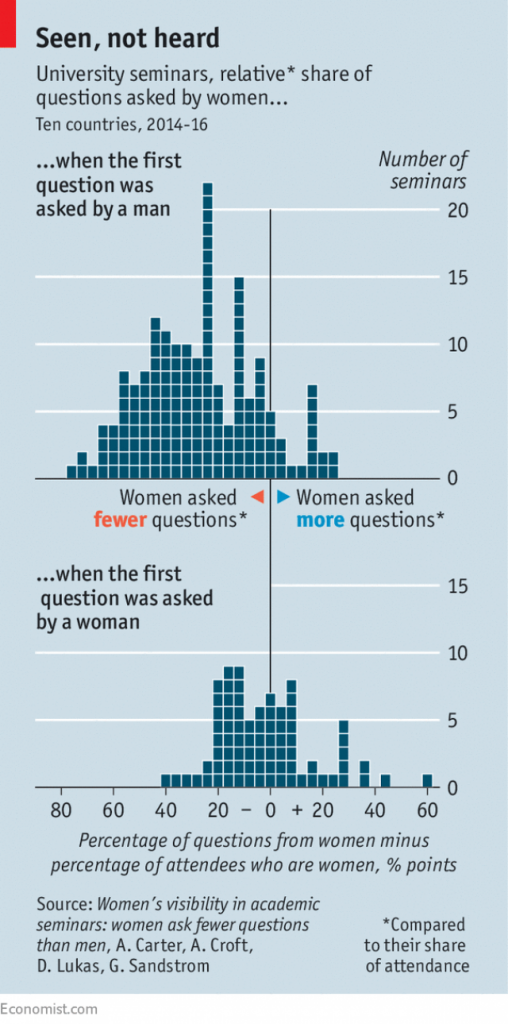I spotted a short item on gender bias in academia in the Economist this week and tweeted it, which then went viral. The tweet read:

‘In academic seminars, ‘Men are > 2.5 times more likely to pose questions to the speakers. This male skew was observable only in those seminars in which a man asked first question. When a woman did so, gender split disappeared’. CHAIRS PLEASE NOTE – FIRST Q TO A WOMAN – EVERY TIME.’
Which confirms an impression I’ve had when chairing assorted discussions – if you let men dominate from the start, it stays that way, but call on women for the first few questions, and things work out much better.
The research paper that backs up the stats can be found here. It’s based on survey responses of over 600 academics in 20 countriesand observational data from almost 250 seminars in 10 countries. Kudos to the authors, Alecia Carter, Alyssa Croft, Dieter Lukas and Gillian Sandstrom. Their broader recommendations are:
‘Increasing the time for or number of questions reduces the imbalance in the questions asked. We recommend that, where possible, the question time not be limited. This could be achieved through, for example, booking a seminar room for longer than one hour so that the next event in the room does not cut short the question time. Having said this, our data suggest that to overcome the male-first question bias, upwards of 25 min is needed for questions, which was a rare occurrence in our data and additionally may be a taxing requirement for the speaker after having given a seminar.
Alternatively, keeping questions and answers short will allow more questions to be asked during a given question period, and could be an alternative method to allow greater balance in the questions asked. We feel that more could be done through active changes in speakers’, attendees’ and particularly moderators’ behaviour. Having an active, trained moderator may avoid those situations where one audience member seems to be “showing off” (which survey respondents claim to be the case quite often), or is going off-topic, or a speaker who goes over time.
We would recommend that, should the opportunity arise, a female-first question be prioritised because this was a good predictor of low imbalance in the questions asked in our observational data. In addition, moderators could be trained to see the whole room (location was mentioned as a factor), and to maintain as much balance as possible with respect to gender and seniority of question-askers. In the open-ended survey questions, respondents complained that moderators call on people they know or more senior people, overlooking the rest.

Although it may seem fair to call on people in the order that they raise their hands, doing so may inadvertently result in fewer women and junior academics asking questions, since they often need more time to formulate questions and work up the nerve.
Our data clearly show that women are not inherently less likely to ask questions when the conditions are favourable—there is no gender bias when a woman asks the first question. Our suggestions should be seen as aims to create favourable conditions that remove the barriers to speaking up and being visible.’
One of the single most useful bits of gender-related research I’ve read in a long time. I will do things differently from now on.
Update: most useful additional advice on twitter comes from Joe Smith. He attended a recent seminar where the chair announced he would take Qs in order ‘girl-boy-girl-boy’. Lets people know in advance, is obviously fair, and is light hearted and infinitely preferable to male chair ‘look how feminist I am’ trumpet-blowing.